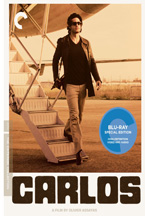
(Carlos was released by IFC Films in 2010. It is now available on DVD and Blu-ray via Criterion.)
Olivier Assayas’s globetrotting Carlos is among the most in-depth, fully-realized character studies in recent years, and not just because of its marathon runtime of five-and-a-half hours. As the infamous title terrorist, Edgar Ramirez packs so many nuanced gestures—with his eyes, with his hands—into any given minute that we almost don’t need to hear him speak. (But speak he does—in about five different languages.) One of his most, ahem, revealing moments comes early on when, after listening to a news report of his latest act of terrorism while luxuriating in a hotel bathtub, he walks across the room and examines his naked form in front of a mirror. We’ve no doubt that “The Jackal” likes what he sees. As presented by Assayas, this man’s entire life is a testament to itself, with the rock star of a terrorist’s notoriety and determination being matched only by his ever-expanding ego. It’s difficult, at first, not to think of Assayas as being similarly taken with his charismatic protagonist, but that view quickly fades as it’s made clear that the filmmaker is allowing his subject’s ridiculousness to speak for itself. His trajectory is not unlike that of a character like Henry Hill in Goodfellas in that early events foreground the highs of his early successes while later acts show the legend as he slowly diminishes into a tired, aging man whose glory days have long since passed.
There’s more to Carlos than just Carlos, however. Assayas immerses us in the frontline of the Popular Front for the Liberation of Palestine’s (PFLP) decades-long international conflict, often weaving in archival footage (as well as footage manipulated to make it appear archival) in what amounts to the fictional equivalent of embedded cinematic journalism. Though Carlos often seems larger than life, he’s ultimately only one part of the campaign that consumed the better part of two decades. The film skips ahead months and years ahead at frequent intervals, often jumping between global cities at the same time, but Carlos grows remarkably little as a person. At film’s end, he’s still the same self-centered ideologue he was at the beginning, the main difference being how few people are still convinced by him. This isn’t a screenwriting flaw so much as one last damning detail whose lengthiness underscores just how shallow Carlos is.
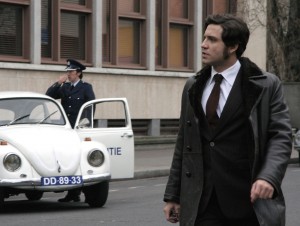 Geopolitical intrigue thus takes a backseat to ego-stroking, and there’s ultimately no use debating Carlos’s status as a one-man show. Though Assayas is often intimate in his portrayal of him, he also leaves enough distance between viewer and subject to let the man’s self-centered philosophy reveal how shallow and skewed it truly is. Sex and violence are two sides of the same coin for him; he fetishizes his weapons—going so far as to call them an extension of his body and use a hand grenade as an aphrodisiac for his latest partner—and sleeps with even more people than he kills. Carlos is given to defusing situations by further igniting them, such as a tense scene in Part One (the film was originally released as a three-part miniseries for French television) when two tipped-off cops break up a small apartment party looking for him. After smooth-talking the investigators, Carlos walks into the bathroom, recovers a stashed gun, then comes back and shoots the two cops, a once-friend who’s just ratted him out, and another just-arrived cop as well. He then leaves the apartment only to come back moments later and shoot his former comrade once more for good measure. Possessing equal parts charm and sang frois, he brushes it off immediately; true to narcissistic form, “check tomorrow’s papers” is all he tells his girlfriend upon being asked what’s happened when he arrives at her apartment minutes later.
Geopolitical intrigue thus takes a backseat to ego-stroking, and there’s ultimately no use debating Carlos’s status as a one-man show. Though Assayas is often intimate in his portrayal of him, he also leaves enough distance between viewer and subject to let the man’s self-centered philosophy reveal how shallow and skewed it truly is. Sex and violence are two sides of the same coin for him; he fetishizes his weapons—going so far as to call them an extension of his body and use a hand grenade as an aphrodisiac for his latest partner—and sleeps with even more people than he kills. Carlos is given to defusing situations by further igniting them, such as a tense scene in Part One (the film was originally released as a three-part miniseries for French television) when two tipped-off cops break up a small apartment party looking for him. After smooth-talking the investigators, Carlos walks into the bathroom, recovers a stashed gun, then comes back and shoots the two cops, a once-friend who’s just ratted him out, and another just-arrived cop as well. He then leaves the apartment only to come back moments later and shoot his former comrade once more for good measure. Possessing equal parts charm and sang frois, he brushes it off immediately; true to narcissistic form, “check tomorrow’s papers” is all he tells his girlfriend upon being asked what’s happened when he arrives at her apartment minutes later.
This unique skill set relies on the inability to see others in black and white, with-me-or-against me terms. As Carlos’s list of enemies grows, so does the film’s body count. Once this fundamental, empathetic switch is turned off (assuming it was ever on in the first place), he’s able to do terrible things on an increasingly grand scale. Carlos doesn’t conceive of murder as ending the life of another man with dreams, relationships, and thoughts of his own; it’s simply a means to an end that carries the added benefit of raising his profile. Whether his ultimate goal is indeed the revolution or something more personal (read: his oft-mentioned ego) is up to the viewer to decide. At once plainspoken and a blowhard, he puts his methods thusly when planning a raid of an OPEC meeting in 1975:
“Anyone who resists will be executed. Anyone who doesn’t obey our orders immediately will be executed. Anyone who panics will be executed. Even if a member of the commando doesn’t obey my orders or doesn’t follow the instructions outlined in advance, he will be executed.”
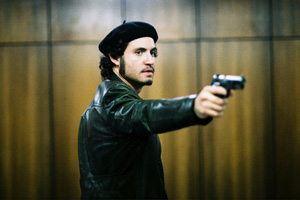 At the outset of the raid just mentioned, he says something no less telling: “My name is Carlos. You may have heard of me.” If he doesn’t actively seek the spotlight, Carlos certainly doesn’t mind being thrust into it. Though not exactly power-hungry, he demands the same level of dedication to the cause from everyone around him that he exhibits. When he doesn’t receive this—which is often—problems arise. On the surface, he emanates a calm and collected vibe, but he’s such a cipher that any depth lurking beneath is called into question. As his sheen of glamour erodes, we’re left to face some rather ugly truths: Carlos, between his cold-blooded murders and rampant narcissism, barely registers as a figure worthy of the slightest bit of sympathy. Increasingly repugnant (forget unlikeable), he nevertheless continues to fascinate if only because we’re left wondering how and why he came to be the way he is. Assayas offers nothing in the way of backstory, and what precious few details hint at Carlos’s inner self come either in gestures or between the lines of his many rants. Though monomaniacal in his devotion to furthering his cause, he’s repeatedly chastised for being reckless and undisciplined. This eventually leads to him splintering away from his wing of the PFLP and starting one of his own—among friends at last.
At the outset of the raid just mentioned, he says something no less telling: “My name is Carlos. You may have heard of me.” If he doesn’t actively seek the spotlight, Carlos certainly doesn’t mind being thrust into it. Though not exactly power-hungry, he demands the same level of dedication to the cause from everyone around him that he exhibits. When he doesn’t receive this—which is often—problems arise. On the surface, he emanates a calm and collected vibe, but he’s such a cipher that any depth lurking beneath is called into question. As his sheen of glamour erodes, we’re left to face some rather ugly truths: Carlos, between his cold-blooded murders and rampant narcissism, barely registers as a figure worthy of the slightest bit of sympathy. Increasingly repugnant (forget unlikeable), he nevertheless continues to fascinate if only because we’re left wondering how and why he came to be the way he is. Assayas offers nothing in the way of backstory, and what precious few details hint at Carlos’s inner self come either in gestures or between the lines of his many rants. Though monomaniacal in his devotion to furthering his cause, he’s repeatedly chastised for being reckless and undisciplined. This eventually leads to him splintering away from his wing of the PFLP and starting one of his own—among friends at last.
The third part, which is by far the least exciting, is probably also the most realistic. When the more successful operations fade, they give way to a wife, kids, and extra pounds here. Just as its star’s life has peaked, so has Carlos itself—but it’s nevertheless essential to show the results of Carlos’s many decisions and actions. This isn’t cinematic comeuppance so much as the way it is, but the picture is a bleak one all the same: the number of countries he’s even allowed entry to has shrunk to practically zero, his wife (a revolutionary-turned-housewife) wants nothing to do with him, and his lifelong mission has barely advanced. Watching him lecture on guerilla warfare to a classroom full of blank-faced students, describe testicle pain to his doctor, and decide to have liposuction performed are uniformly pathetic sights, but they’re also somehow the logical conclusion to the chain of events he’s been part of for decades. The last one to be disillusioned, his ability to inspire others—and himself—has faded with his youth, looks, and hairline.
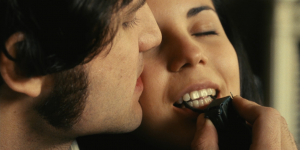 Audio/Visual: Carlos takes place all across Europe, the Middle East, and Northern Africa, maintaining a largely consistent aesthetic throughout. It was shot by two different cinematographers—Yorick Le Saux and Denis Lenoir—and the minor differences in visual quality—sharpness, color, etc.—tend to relate to the film’s many different locations. Earth tones, fluid (but never shaky) camerawork, and film grain abound; they’re also joined by such period details as a constant haze of cigarette smoke that cuts through occupied office buildings’ fluorescent lighting. Assayas’s film looks and feels its ’70s and ’80s setting, and it’s rendered beautifully by Criterion’s 1080p, 2:35:1 transfer. As for sound, I’ve no complaints±—gunfire and explosions are as sonorous as Carlos’s voice, and even most the heavily-accented dialogue can be heard with the utmost clarity.
Audio/Visual: Carlos takes place all across Europe, the Middle East, and Northern Africa, maintaining a largely consistent aesthetic throughout. It was shot by two different cinematographers—Yorick Le Saux and Denis Lenoir—and the minor differences in visual quality—sharpness, color, etc.—tend to relate to the film’s many different locations. Earth tones, fluid (but never shaky) camerawork, and film grain abound; they’re also joined by such period details as a constant haze of cigarette smoke that cuts through occupied office buildings’ fluorescent lighting. Assayas’s film looks and feels its ’70s and ’80s setting, and it’s rendered beautifully by Criterion’s 1080p, 2:35:1 transfer. As for sound, I’ve no complaints±—gunfire and explosions are as sonorous as Carlos’s voice, and even most the heavily-accented dialogue can be heard with the utmost clarity.
Supplements: An abundance. There are interviews with Assayas, Ramirez, cinematographer Lenoir, and even a left-wing militant who goes by the name of Angie that, by themselves, come out to roughly two hours’ worth of footage; two feature-length documentaries (one, about Carlos himself, is an hour, while the other, about an act of terrorism carried out in his name, runs at an hour-and-a-half); a 20-minute featurette on the filming of the OPEC sequence, which is arguably the most important sequence in the entire film; selected-scene commentary from Lenoir; and a trailer. The interviews with director and star are particularly insightful, especially since they focus on Carlos himself, whom the film shies away from characterizing too strongly in any one direction. Both the three-part film and this excellent assortment of extras are split across two discs, which come inside a rather nice slipcase accompanied by an illustrated booklet featuring even more material. I own many Criterion DVDs and Blu-rays, and this is among the best—which, considering their track record, is saying a lot.
— Michael Nordine









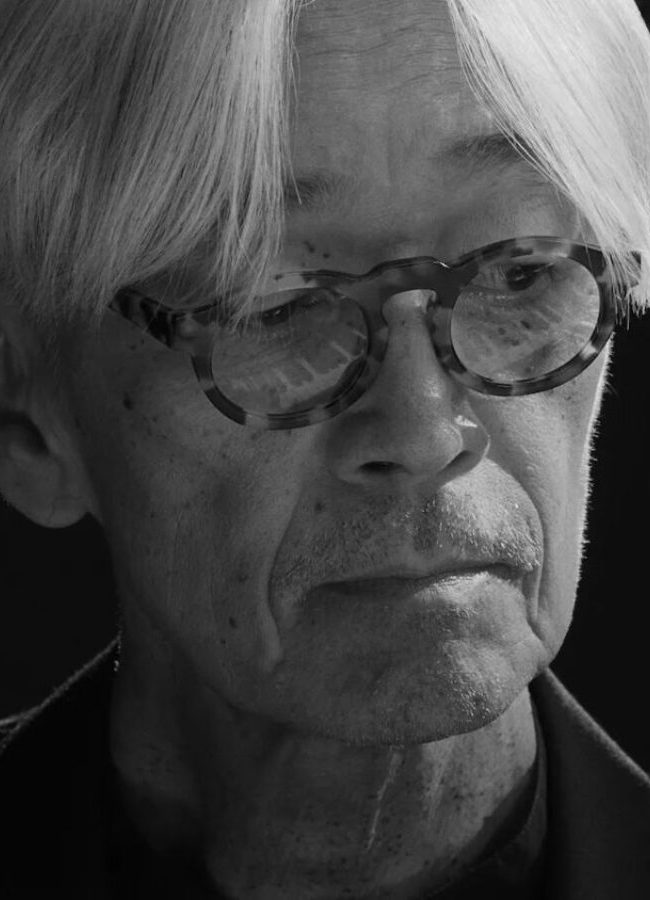


Pingback: HOME VIDEO PICKS – Hammer to Nail